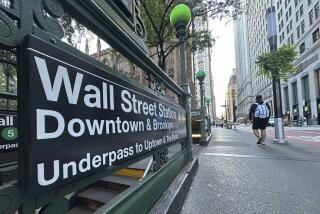World financial markets shudder as China starts to put brakes on its fast-growing economy
- Share via
Reporting from Los Angeles and Beijing — China, the primary engine leading the global economy out of recession, is starting to put the brakes on its fast-growing economy -- and the rest of the world is watching closely.
Chinese regulators reportedly ordered some banks Wednesday to reduce their lending, the latest in a series of steps the government is taking to tighten credit and stave off the sort of asset bubble that felled the U.S. housing and credit markets.
The move was expected, but nonetheless sent a shudder through global financial markets on fear that any moderation in China’s expansion could stymie the global rebound and weigh on slow-growing countries such as the United States.
The Dow Jones industrial average skidded more than 200 points early Wednesday before partially recovering to finish down 122 points. China’s main stock index sank nearly 3%, and several European markets fell more than 2%.
“China led the way out [of the recession], and it’s been an important source of growth for much of the global economy, including our own,” said Mark Zandi, chief economist at Moody’s Economy.com in West Chester, Pa. “This signals that we can’t count on China to power growth like they have for much longer.”
China’s economy remains robust and will still fuel the global rebound, experts said.
Figures released early today in Beijing showed the country’s economy grew 10.7% in the last three months of 2009 from the fourth quarter of 2008. Economic output for all of last year was up 8.7% from the year before, easily surpassing the government’s target of 8%.
Still, Beijing’s credit moves underscored the still-fragile condition of the world’s industrialized economies, which have relied heavily on a combination of government stimulus efforts and breakneck growth in emerging markets to overcome weak demand by businesses and consumers at home.
Exports to China, especially for machinery and other heavy equipment, have been a rare bright spot for the U.S.
“The concern is that if you remove the [boost from China] too soon, you’re effectively taking the patient off life support when he or she shouldn’t be taken off,” said Joseph LaVorgna, an economist at Deutsche Bank in New York.
Many experts believe that the U.S. economy is gaining enough strength to withstand any diminution of Chinese growth. But much will depend on how soon key areas such as housing and employment can thrive without support from public stimulus funds.
“Frankly, the only thing going our way has been our ability to export, and if the global situation slows you’d better hope the other engines are running again, and thus far they haven’t been running on their own,” said Diane Swonk, chief economist at Mesirow Financial in Chicago. “The only gas they’ve been getting is from the federal government.”
Beijing announced Wednesday that it would slow credit this year and reportedly ordered some banks to temporarily stop lending, the strongest signs yet that officials hope to curb asset bubbles and inflation.
Liu Mingkang, chairman of the China Banking Regulatory Commission, said Chinese banks would extend $1.1 trillion in loans this year -- down from a record $1.4 trillion in 2009.
Speaking at a forum in Hong Kong, Liu denied a report in a state-run newspaper that some banks had already extended too much credit and were instructed to cease all lending for the remainder of January.
The news sent the Shanghai composite index down 2.9%.
Commodity prices fell on the prospect that China’s demand for raw materials would be lower than previously forecast.
The dollar rose in currency markets as investors sought out havens.
In contrast to the U.S., Chinese regulators have taken steps to rein in surplus liquidity. Interest rates on the central bank’s three-month bills recently rose for the first time since August. And in a surprise move last week banks were ordered for the first time in 18 months to boost their reserves to protect against loan losses.
The moves are widely interpreted as a signal by the Chinese government that the central bank will raise interest rates later this year. But economists say that shouldn’t derail the global economy as long as the moves are incremental.
“We don’t see it being the end of the world,” said Alec Young, an international equity strategist at Standard & Poor’s Corp. in New York. “There’s no question the government is looking to slow things down, but we think they can engineer a soft landing.”
Though economic growth is vibrant, China still faces industrial overcapacity and an overheated real estate market fueled by last year’s credit surge.
The price of housing in China’s 70 largest cities grew 7.8% from a year ago. Meanwhile, China’s consumer price index rose 1.9% in December from a year earlier.
More to Read
Inside the business of entertainment
The Wide Shot brings you news, analysis and insights on everything from streaming wars to production — and what it all means for the future.
You may occasionally receive promotional content from the Los Angeles Times.











